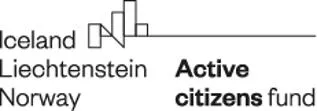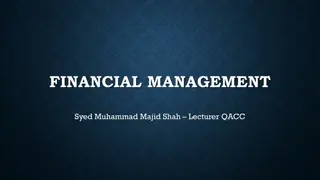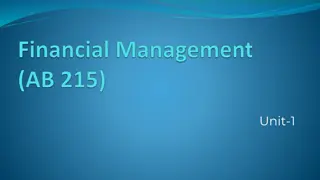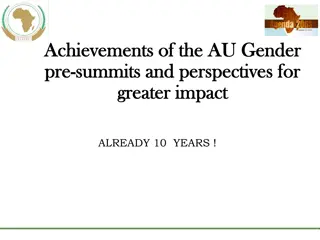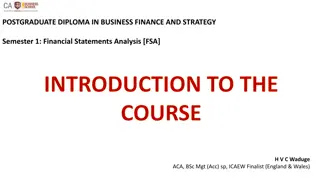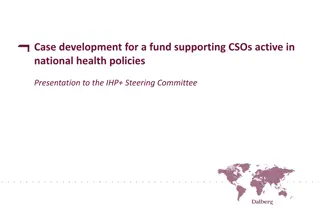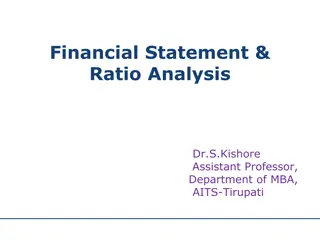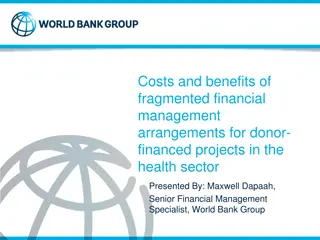Effective Financial Management for CSOs: Key Strategies and Tools
CSOs must prioritize effective financial management to ensure sustainability and integrity. Key aspects include budget creation, expense tracking, debt management, and adhering to budgeting rules. Understanding income, expenses, and project funding are essential for financial health. This unit covers budget essentials, cash flow rules, and expense considerations crucial for CSOs' financial stability.
Uploaded on Mar 27, 2024 | 1 Views
Download Presentation

Please find below an Image/Link to download the presentation.
The content on the website is provided AS IS for your information and personal use only. It may not be sold, licensed, or shared on other websites without obtaining consent from the author. Download presentation by click this link. If you encounter any issues during the download, it is possible that the publisher has removed the file from their server.
E N D
Presentation Transcript
Module 6 Fundraising and Financial Management for CSO s Unit 2: Financial Management The EMERGE project benefits from a grant under the Active Citizens Fund Cyprus program, funded by Iceland, Liechtenstein and Norway, through the EEA and Norway Grants 2014-2021.
Unit Overview Keeping a CSO healthy and sustainable requires effective financial management. When attracting donors, a CSO must be confident that it can distribute and manage finances efficiently in order to uphold integrity, reputation, and reliability. In this unit, we will learn a basic understanding of how to: Create a budget Track and monitor expenses Save money and distinguish between the different types of debt
Budgeting - The Key to Cash Flow Budgets are created for the purpose of being able to tell your money where to go, and not chase where it went or where it s going. They are the backbone of every great cash flow, which can ensure greater sustainability for the CSO There are various elements that constitute a budget, such as: Must do expenses Wanna do expenses Savings and provisions Expenses and their expected payment dates Creating different wallets Knowing which debt to take on if ever needed
A Basic Rule to Apply To a CSOs Budget For a CSO to ensure that it is creating an appropriate budget it requires a basic understanding of its cash flow. A rule to follow is the 50-20-20-10 rule. That is: 50% to expenses 20% to paying off debt 20% for investments in wanna-do projects 10% to savings for new projects and emergency provisions These elements are all affected by, and must be benchmarked against: How much money is coming in How much money is going out When expenses are due Create wallets of must do expenses Make provisions for wanna do expenses
Basics of Building a Budget Exercise 1 - Determine Your Budget and List Budget Items List 2 items for each of the following: Income Expenses Projects that are relevant today to save for
Expenses When listing and navigating expenses, there are several factors for a CSO to consider. These include: Paying: Employees Suppliers Partners Keeping track of: Accounting Taxes Charges
Expenses - Employees, Suppliers, and Partners The first thing a CSO must do when money comes in, is to pay their employees and suppliers. Employees need regular income. Maintain a regular and scheduled payment with employees salaries, benefits, social security, and insurances. This is crucial to a CSO s reputation Suppliers have accounts payable terms. They require 15 or 30 or 40 day repayment periods It is important for a CSO to set their own accounts receivable terms so that there is not much difference between when a CSO receives payment from donors/clients and when suppliers are paid Monitor the number of days difference there are between accounts payable and accounts receivable
Expenses - Keeping Track of Accounting, Taxes, and Charges Tracking the necessary expenses of an organization is important to maintain a healthy cash flow. Knowing when expenses are due and having enough money to fulfil those payments is a skill that should not be overlooked. The following considerations are key elements to review regularly to ensure a CSO has the best rates and charges available in the market: Banking charges Rentals Insurance A CSO must ensure to track taxes and charges through a forward looking cash flow to make provisions so that payments are made in a timely manner. Independent and skilled accounting for the CSO is an important part of fundraising. Audited accounts are transparent and help guide the leadership of where money should be going for the forward looking cash flow and management periods.
Saving and Debt As we initially stated at the start of this unit, 20 % of a CSO s income goes to savings for wanna do expenses/projects, and 10% goes to emergencies. They are the safety net of budgeting. It requires discipline, regular tracking of spending habits, truthfulness, and transparency in the budgeting cycle. The 20% can be placed in an interest earning account (now that the market is moving beyond negative interest rates) and can make money work for you, that is, money earning money. Homework would include terms for interest earning accounts, such as: Charges Is the money meant to be locked into the account for a specified period of time When can the money and interest be released and available to the CSO?
The Two Main Types of Debt As for debt, it is recommended for CSO s to avoid debt, and instead to work towards self-financing growth and projects through savings. However, it is important to know the two main types of debt, and what they entail: Through the founders - It must be repaid regularly, not as salary, but as debt repayment. It may have the most favorable terms as opposed to those of banks or other commercial institutions Banks - This debt is typically more expensive and would need guarantees such as personal and income guarantees. In this way, money is borrowed to either grow the organization, or for a specific project
Unit 2 Review In this module, we learned that for a CSO to succeed, it must establish and maintain a healthy cash flow. The foundations of a cash flow require: Tracking and spending regularly as often as weekly, bi-weekly, and monthly. Doing so creates a sense of discipline and also provides a sense of security A good forward looking cash flow will keep track of expenses that are upcoming and may require some saving Donors seek CSO s that are disciplined, that track and benchmark their cash flow and budgeting, and proactive management and leadership. It ultimately entails a mindset of discipline, organization, and good governance
Worksheet Create a forward looking cash flow for a 3 month budget that includes: An income line Must-do expenses Wanna-do expenses Savings The total difference for each month
The EMERGE project benefits from a grant under the Active Citizens Fund Cyprus program, funded by Iceland, Liechtenstein and Norway, through the EEA and Norway Grants 2014-2021.

 undefined
undefined


